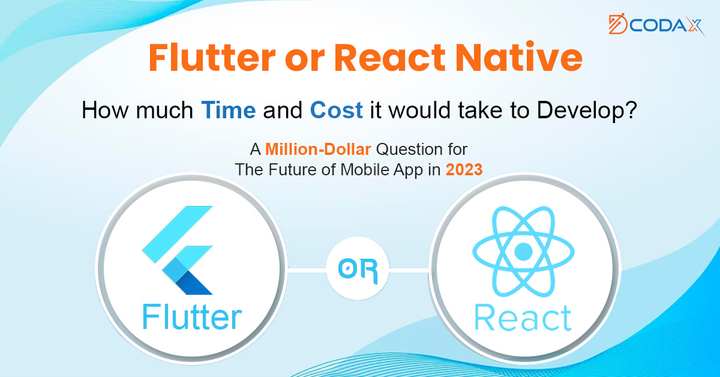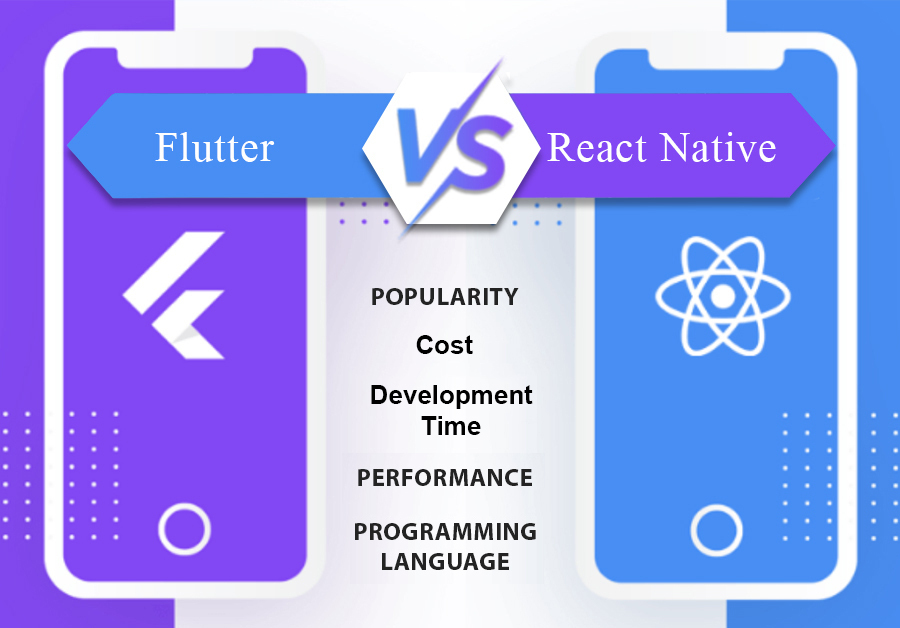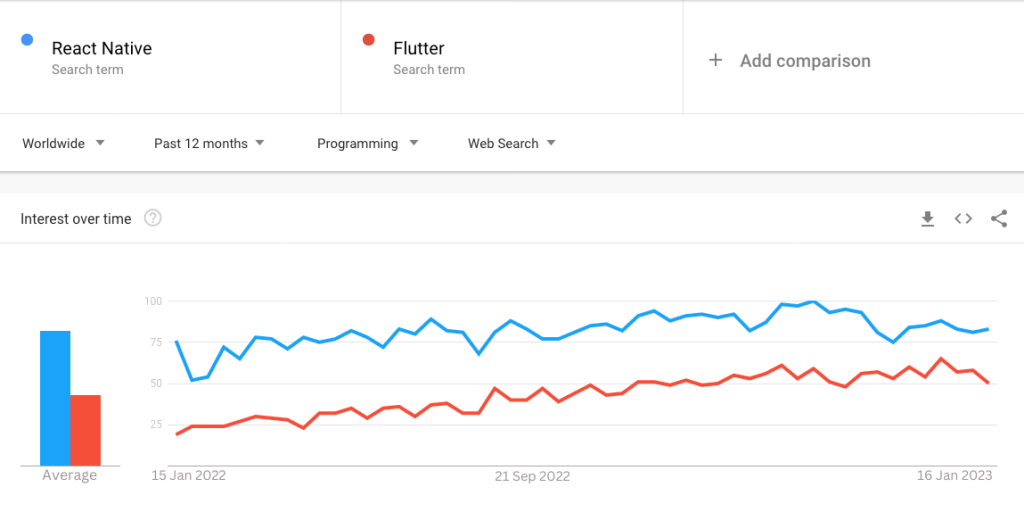Flutter or React Native: The Million Dollar Question for the Future of Mobile Apps in 2023

In the realm of app development frameworks, Flutter Apps and React Native Apps stand out as the top contenders. Although both frameworks have strengths and weaknesses, choosing between them has become challenging due to their growing popularity and advanced features. The decision of which framework to use can have a significant impact on the productivity and functionality of your application.
Developing a poorly designed mobile application can lead to devise overheating, lag, and malfunction, making it crucial to select the proper framework for your application. This has given rise to the long-standing debate between native and cross-platform application development, specifically, the heated conflict between Flutter and React Native.

Flutter, an advanced-garde cross-platform application development framework, has been meticulously engineered by Google, propelling developers to create awe-inspiring native Android, iOS, and Web applications with exceptional ease. In a groundbreaking move, Flutter 2.0 has recently extended its support for desktop applications, further amplifying its versatility for app development.
With Flutter, the power to create high-performance, visually captivating cross-platform applications that are optimized for diverse devices is at your fingertips, all while maintaining a single codebase. This not only expedites the development process but also mitigates the possibility of defects, ultimately leading to a higher return on investment for clients.

React Native, the brainchild of Facebook is a remarkable open-source UI software framework that has revolutionized the world of app development. This powerful framework empowers developers to seamlessly integrate the React framework with native platform features, allowing them to create stunning apps for Android, iOS, Web, and Windows with ease.
React Native has the added advantage of allowing developers to share most of the code they create across multiple platforms, making it incredibly efficient to develop for both Android and iOS simultaneously. This not only saves time and resources but also ensures that the app is optimized for a wide range of devices.
Flutter vs React Native

Popluarity:
The two frameworks share a remarkable similarity in terms of popularity, especially in the arena of cross-platform app development technological advancements. With their recent emergence and immense community backing, both frameworks have successfully taken over the technological community, leaving a substantial impact in their wake.
Interestingly, React Native App Development framework, released in 2015, boasts a more significant community and user base compared to Flutter app development framework, which was introduced three years later in 2018. However, with the backing of Google, it’s only a matter of time before Flutter catches up to React Native, and we witness an exciting shift in the cross-platform app development space.
Cost:
The cost of developing a Flutter or React Native app can vary widely depending on various factors, such as the complexity of the app, the features and functionalities required, and the expertise of the development team.
On average, the cost of developing a simple Flutter app range from $2,000 to $6,000 and for a complex app the cost would be $10,000 but, on the contrary, for developing a React Native app it costs about $5,000 to $8,000 and for developing a complex app in React Native it could cost about $13,000 to $16,000. These costs may include expenses related to development tools, third-party services, hosting and infrastructure, and ongoing maintenance and support.
It’s important to keep in mind that the cost of development is just one factor in the overall cost of creating a mobile app. Other costs to consider include marketing and advertising, app store fees, and ongoing updates and maintenance.
Developing Time:
The amount of time required to develop a Flutter or React Native app can depend on various factors such as the complexity of the app, the features and functionalities required, and the expertise of the development team.
In general, Flutter is considered to have a faster development time than React Native due to its “hot reload” feature that allows developers to see changes in real-time, making it faster to iterate and test new features. React Native also has a fast development time, but it can be slightly slower than Flutter due to its reliance on JavaScript.
On average, a simple Flutter or React Native app can take anywhere from 2 to 6 months to develop, while more complex apps can take up to a year or more. However, this can vary widely depending on the specific requirements of the project and the expertise of the development team.
Programming Language:
React Native, which was first introduced by Facebook, employs the widely popular Javascript programming language, known for its versatility and ease of use. Javascript is a dynamic programming language that allows developers to write and modify code on the fly, making it an excellent choice for fast and efficient app development.
On the other hand, Flutter uses a different programming language called Dart, which was also created by Google, the company behind Flutter itself. Dart is an object-oriented language that focuses on ease of use, fast development, and efficient performance. One of the benefits of using Dart is that it has its own virtual machine, which allows Flutter apps to perform exceptionally well on both iOS and Android devices.
Performance:

When it comes to performance, React Native and Flutter differ significantly in their approach to handling the app development process. React Native employs a bridge that connects the app’s Javascript code to the native environment of the device, enabling cross-platform functionality. However, this approach may sometimes cause performance issues, particularly with larger, more complex apps.
Flutter, on the other hand, uses a unique approach called the Flutter engine, which eliminates the need for a bridge altogether. Instead, it renders widgets using its own graphics engine, Skia, resulting in smoother animations and faster overall performance.
Conclusion
React Native and Flutter have both gained immense popularity in the cross-platform mobile app development technology trends. Despite being relatively new, with React Native being released in 2015 and Flutter in 2017, they have garnered significant attention from developers worldwide.
While both frameworks are exceptional for mobile app development, Flutter offers a unique set of capabilities that can help create more visually appealing mobile apps with better user experiences, saving time and money in the process. Additionally, Flutter’s popularity continues to grow, particularly among businesses, as Google continues to refine its tool, resulting in monthly advancements in the Flutter SDK. Furthermore, the Flutter community is known for its enthusiastic and collaborative spirit, always willing to assist and share knowledge.
Flutter’s distinctive rendering engine enables developers to create truly distinctive designs, albeit at the cost of greater project weight. In contrast, React Native has limitations to the use of native components, which may require manual customization. Flutter also offers the added benefit of immediate integration into the desktop environment, whereas a React app must go through a web interface as an intermediate.
Are you feeling overwhelmed by the prospect of Flutter and React Native App Development? Don’t worry, you’re not alone. Many of our clients come to us with this comparison in their mind; Either to choose Flutter or React Native and we always say them “Worry is for those; who don’t have Dcodax”
At Dcodax, we’re dedicated to helping you create a truly user-validated product. We pride ourselves on being straight-shooters who are committed to your success. So if you’re looking for a team that will guide you every step of the Flutter App Development or React Native App Development, look no further.
With Dcodax by your side, the sky’s the limit!
For Any Type of Free Consultancy, Dcodax is Always Available for your Help.
For more; Contact Us Now





